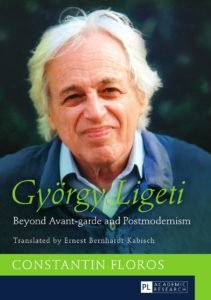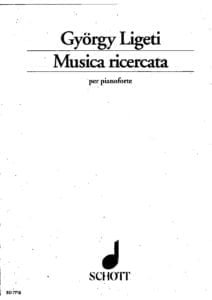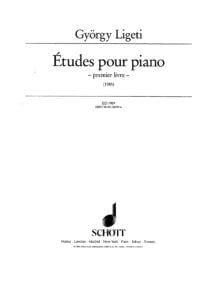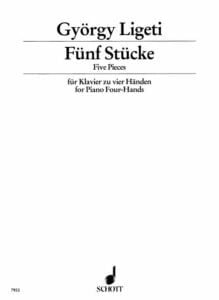Table of Contents:
Ligeti (sheet music in the #smlpdf)

Ligeti – Hungarian Rock
Ligeti – Lux Aeterna
Ligeti – Trois Bagatelles (Noten, sheet music)
Ligeti – Études pour piano (Complete)
Ligeti, Gyorgy – Musica ricercata (complete)
Ligeti, Gyorgy – Solo Cello Sonata
Ligeti, György – Fünf Stücke Für Piano (4 Hands)
Best Sheet Music download from our Library.
Please, subscribe to our Library. Thank you!

The Best of György Ligeti
Track List:
0:00:00 6 Bagatelles 1/6 0:01:08 6 Bagatelles 3/6 0:03:29 Musica Ricercata 0:06:00 Hungarian Rock 0:10:59 Atmospheres 0:19:23 Artikulation 0:23:24 Continuum 0:27:12 String Quartet No. 1 0:47:46 Devil’s Staircase 0:54:16 Chamber Concerto 1:13:29 Piano Concerto 1:35:47 Síppal, dobbal, nádihegedüvel 1:46:59 Cello Sonata 1:54:43 Requiem – II Kyrie 2:02:02 Lux Aeterna 2:11:56 Nouvelles aventures

Please, subscribe to our Library. Thank you!

Best Sheet Music download from our Library.
György Sándor Ligeti (short bio)
György Sándor Ligeti (/ˈlɪɡəti/; Hungarian: [ˈliɡɛti ˈɟørɟ ˈʃaːndor]; 28 May 1923 – 12 June 2006) was a Hungarian-Austrian composer of contemporary classical music.
Ligeti has been described as “one of the most important avant-garde composers in the latter half of the twentieth century” and “one of the most innovative and influential among progressive figures of his time”.
Born in Romania, he lived in the Hungarian People’s Republic before immigrating to Austria in 1956. He became an Austrian citizen in 1968. In 1973, he became professor of composition at the Hochschule für Musik und Theater Hamburg, where he worked until retiring in 1989. He died in Vienna in 2006.
Restricted in his musical style by the authorities of Communist Hungary, only when he reached the West in 1956 could Ligeti fully realise his passion for avant-garde music and develop new compositional techniques. After experimenting with electronic music in Cologne, Germany, his breakthrough came with orchestral works such as Atmosphères, for which he used a technique he later dubbed micropolyphony. After writing his “anti-anti-opera” Le Grand Macabre, Ligeti shifted away from chromaticism and towards polyrhythm for his later works.
He is best known by the public through the use of his music in film soundtracks. Although he did not directly compose any film scores, excerpts of pieces composed by him were taken and adapted for film use. The sound design of Stanley Kubrick’s films, particularly the music of 2001: A Space Odyssey, drew from Ligeti’s work.
Ligeti has been described as “together with Boulez, Berio, Stockhausen, and Cage as one of the most innovative and influential among progressive figures of his time”.
From about 1960, Ligeti’s work became better known and respected.[clarification needed] His best-known work was written during the period from Apparitions to Lontano, which includes Atmosphères, Volumina, Aventures and Nouvelles Aventures, Requiem, Lux Aeterna, and his Cello Concerto; as well as his opera Le Grand Macabre. In recent years, his three books of piano études have also become well known and are the subject of the Inside the Score project of pianist Pierre-Laurent Aimard.
Music in the films of Stanley Kubrick
Ligeti’s music is best known to the public not acquainted with 20th century classical music for its use in three films of Stanley Kubrick’s, which gained him a world-wide audience. The soundtrack to 2001: A Space Odyssey includes excerpts from four of his pieces: Atmosphères, Lux Aeterna, Requiem and Aventures.
Atmosphères is heard during the “Star Gate” sequence, with portions also heard in the Overture and Intermission. Lux Aeterna is heard in the moon-bus scene en route to the Tycho monolith. The Kyrie sequence of his Requiem is heard over the first three monolith encounters. An electronically altered version of Aventures, unlisted in the film credits, is heard in the cryptic final scenes. The music was used, and in some cases modified, without Ligeti’s knowledge, and without full copyright clearance. When he learned about the use of his music in the film, he “successfully sued for having had his music distorted” and they settled out of court. Kubrick sought permission and compensated Ligeti for use of his music in later films.
Lux Aeterna was used again in Peter Hyams’s 1984 sequel to 2001, 2010.
A later Kubrick film, The Shining, uses small portions of Lontano for orchestra.
One motif from the second movement of Ligeti’s Musica ricercata is used at pivotal moments in Kubrick’s Eyes Wide Shut. At the German premiere of that film, by which time Kubrick had died, his widow was escorted by Ligeti himself.
Music in other films and media
Ligeti’s work has also been used in numerous films by other directors. Lontano was also used in Martin Scorsese’s 2010 psychological thriller film Shutter Island. The first movement of the Cello Concerto was used in the Michael Mann 1995 crime film Heat. The Requiem was used in the 2014 film Godzilla The Cello Concerto and the Piano Concerto were used in Yorgos Lanthimos’ 2017 film The Killing of a Sacred Deer.
His music has also been used in television and radio. Lontano, Atmosphères, and the first movement of the Cello Concerto were used in Sophie Fiennes’s documentary Over Your Cities Grass Will Grow, about the German post-war artist Anselm Kiefer. Lontano, Melodien, and Volumina were used in Fit the First, Fit the Fifth, and Fit the Sixth of the radio series of The Hitchhiker’s Guide to the Galaxy as background music to sections of narrative from the Guide.
